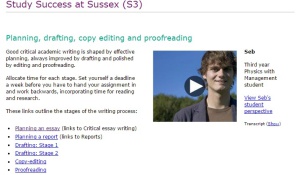
creative commons licensed (BY-NC-ND) flickr photo by UBC Library
There are many mobile apps and browser-based digital tools that are designed to help with life at university, but it can be difficult to know which to choose for particular tasks.
In September we ran a blog post on ‘Smarter Study’ which identified 5 essential apps for students. Today we are focusing on writing for university and highlighting how tools can come together in a digital writing workflow.
Preparation
Preparation is key to good performance. You can streamline your writing by organizing your time, defining the task, breaking it down into pieces and managing the paperwork.
Wunderlist allows you to create lists of tasks, sort them, share them and sync them across all your devices. It is useful for:
- breaking down the assignment into its component parts;
- planning your time;
- keeping track of your progress;
- organizing group projects.
Evernote is designed for making, saving, organizing and syncing notes. As well as typing text notes you can capture images, record audio notes or attach files. You can use Evernote to:
- make notes as you research your topic;
- tag notes to organise your ideas;
- keep track of projects using tags and notebooks;
- share notebooks for group projects.
Diigo helps you keep track of your online bookmarks wherever you are logging on. You can save, highlight, annotate, tag and organise web sources and synchronise them across all your devices. You can use Diigo to:
- create a library of research for your course topics;
- highlight key points and make notes;
- save references for citing when you write up;
- share resources for group projects.
Managing research resources
Whilst most undergraduates will be able to cope with their research materials using the tools already discussed, postgraduates will want to start looking for more serious tools. One free option is Zotero.
Zotero ‘collects, manages, and cites research sources’ (https://www.zotero.org/). Sussex students can use the Firefox browser plug-in or install it on their own PC or Mac computer but may not install it on university machines. You can use Zotero to:
- collect & manage your research;
- organise a large library of material;
- create citations.
Planning your writing
Once you have done your reading and collected your notes it is time to start planning your writing. There may be more research to do later, but a plan of your ideas and the structure of your argument will help to identify any gaps and guide the writing phase.
Mindmapping is a great way of visualizing concepts, relationships & structures. A tool such as Mindmeister will help you to establish connections between your ideas. You can use Mindmeister to:
- plan the structure of your essay;
- recognise new links between concepts;
- collaborate on group projects.
Drafting and saving

creative commons licensed (BY-NC-SA) flickr photo by theunquietlibrary
It is important to make sure that you save your work regularly and back up your files in a safe place. With Office 365 Sussex students have access to the full suite of Microsoft Office tools on their own devices and one Terabyte (1TB) of cloud storage in Microsoft OneDrive. There are even Office apps for mobile devices so you can work on your project on the go!
Setting up Autosave in Word will ensure that your work is backed up regularly in case your computer crashes. When you are finished working on your document make sure you save it somewhere safe – preferably once on your computer and once somewhere else (perhaps in OneDrive or on a USB stick). If you are using a USB stick be sure to eject it safely or you might corrupt your files and lose your precious work.
Writing should go through several drafts before it is finished, to improve the structure, argument and adjust the word length. Spelling and grammar checkers will help you improve the clarity of your writing.
You will also need to check that you have included all the references for your sources. If you used Evernote or Zotero to organise your materials this should be easy, but for a final check you can use the Turnitin Essay Checking Tool in Study Direct. This will provide you with a report showing the extent to which your writing matches text in the Turnitin database. You can then check whether any matched text has been properly referenced.
These are just a few suggestions for digital tools that can help with writing at university. Our A-Z of apps includes others and we blogged previously about 5 study tools to help with revising. The Study Success at Sussex (S3) website has a wealth of really useful study skills resources and is among the resources that you will find referred to in the Skills Hub.




[…] Read the full story by University of Sussex Technology Enhanced Learning Blog […]